| Glossary Of Picture Framing Terms
[50] |
P
Pantone Color Guide The exhaustive list of all the colors in the Pantone Matching System (PMS). Pantone applies a numerical code to all the colors and shades in its glossary, more than 2,000 distinct colors. |
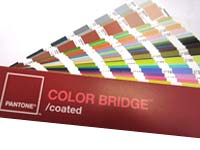 |
Paper weights The weight of a piece of paper is defined by the weight in grams per square meter (gsm). Alternately, weight may be determined by what a set number of sheets would weigh in pounds. Regular bond paper that one might use in a desktop printer is generally 90 gsm or 20-24 lb.
A general breakdown of paper weights by gsm:
35-55 gsm: newspaper
130-170 gsm: posters
350 gsm: business cards |
| Papier-mâché Papier-mâché is a versatile art form involving the use of paper strips or pulp, often combined with adhesive like glue or paste, to create sculptures or other forms. Artists typically layer the paper over a base structure or mold, allowing it to dry and harden. The resulting artwork can range from small decorative objects to large-scale installations, known for their lightweight and often whimsical appearance. |
| Papyrus A thin paper made from the papyrus plant, originally used in ancient Egypt due to the abundance of the plant there. Due to its extreme fragility, great care must be taken in framing artwork on papyrus. Some artists and calligraphers still use it today. |
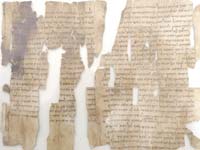 |
| Paste An adhesive used in picture framing to affix the artwork to the backing or mat prior to fitting. Acid-free options are available for working with archival art. |
Pastel Paper Since pastel paintings rarely cover the entire surface on which they are painted, paper selection is important. Pastel papers come in a variety of colors, textures and sizes.
The color of the paper will affect the final temperature of the art, lending a richer or starker tone to the image. Texture options range from extremely smooth to as coarse as sandpaper. |
Pdf (Portable Document Format) A file type that presents the document in a certain format, regardless of the applications available on the receiver's computer. For instance, if a document written on Microsoft Word is saved as .pdf, when opened on another computer it will look just like it did on Word, even if that computer does not have Word.
Pdf documents are opened in a pdf reader, like Adobe Reader or Adobe Acrobat, and can only be edited once saved unless specifications are made that allow changes.
A document is rarely constructed in pdf format. Rather, it is saved in that format after it is completed.
pdf is a text file format, which means digital images should not be saved in this format, unless they are intended to accompany the text. |
| Peach A color that is somewhat paler than its namesake fruit. It presents as an orange-yellow, often with a pinkish undertone. It is generally considered a pastel shade. |
 |
Pecan Pecan tree wood is very hard and not easily worked with. It is a member of the hickory family, and when sold, is generally combined with other hickory woods and sold as "hickory".
In picture framing, pecan is most used to refer to the color - similar to that of the nut itself: a rich, golden brown. |
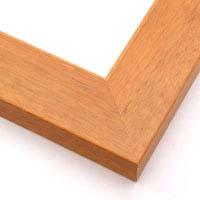 |
Pegboard A thin board with holes drilled at regular intervals across the entire surface. Usually used to hang items by affixing it to the wall and inserting metal pegs or hooks into the holes.
Most often a sheet of MDF or tempered hardwood, but metal and plastic versions are also available. |
Peterboro Matboards Peterboro is a company who manufactures and distributes a variety of picture framing mat boards. They are located in Ontario, Canada.
Order online:Matboards |
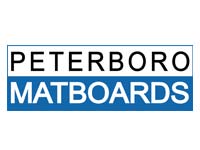 |
| Pewter Color A hue imitative of the metal alloy Pewter. Generally a dull silver finish with a dark antique finish and bluish undertone. |
 |
p
pH A measure of the acidity or basicity of a solution. A product with a pH of less than 7 is considered acidic, while a product with a pH of greater than 7 is basic or alkaline. Products with a pH of 7 are considered neutral. In picture framing, a pH other than 7 can diminish the longevity of the artwork. Framing products such as the mat, paper and backing are coated so as to be pH neutral. |
P
Phillips Screwdriver The tool used to tighten and loosen screws with a cross or X (phillips) slot. The phillips slot and screwdriver have slightly curved inner corners where the cross lines meet. The frearson screw and screwdriver have an X or cruciform shape as well, but straight, 90 degree corners. |
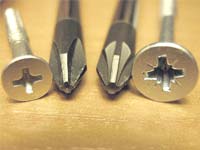 |
| Photo Activity Test (PAT) A standardized testing method that determines the interactions between a photographic print and the materials used to contain it in framing (inks, adhesives, glass, photo albums, etc). Companies can submit their materials to be tested. |
| Photo engraving Photoengraving is a process that uses a light-sensitive photoresist applied to the surface to be engraved to create a mask that shields some areas during a subsequent operation which etches, dissolves, or otherwise removes some or all of the material from the unshielded areas. Normally applied to metal, it can also be used on glass, plastic and other materials. |
| Photoshop Digital image (raster graphics) editing software developed by Adobe. Simply defined, Photoshop allows the user to alter photographs and other digital images by applying layers of filters. Objects can be removed from the image, colors and tones can be changed, and effects can be applied to make the image look, for instance, like a watercolor painting or pencil sketch. |
| Picture Framing Software Picture framing software to manage and sell frames: Artisan Frame Plus, Artteck, Custom Framer, EstLite, ezFramer, FerenSoft Trio!, FrameMan, FrameReady, Framesmart, Framiac FramR, Fullcalc, Gallery Express, GalleryPro, I-Framer, IF Retail, LifeSaver, MarkO, Masterpiece Manager, PCS Framer POS, Adit PFP, QuickPrice, Royall Framing, Specialtysoft, Spinnsoft Gallery, Wessex |
| Pine wood Pine is recognizable by its light, yellowish color. It is a softwood with an even, straight grain, that is easily worked both by hand and by machine. Due to its resinous nature, it may resist paint application, and has a distinct scent during manufacture. Most subspecies of Pine are affordable and popular in picture framing and other woodworking projects. |
Pinner guns A manual tool used in fitting images to picture frames. The gun is very similar to a heavy duty stapler, but the pin (also called points or tabs) is ejected outward from the vertical end, rather than downward from the base.
The pinner gun is placed flush against the backing of the framed image, with the vertical edge pressed against the exposed rabbet of the picture frame. When the trigger is squeezed, a small metal tab is driven partway into the wood, holding the contents of the frame in place.
Also called a point driver, the pins may be flexible, and folded back to change the frame contents, or rigid for more permanent framing projects. |
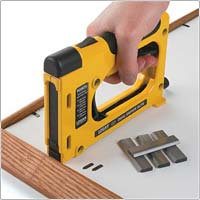 |
| Pixelation All digital images are made up of pixels, and when an image is blown up (increased) too large, these individual pixels can be seen as small square, creating a grainy visual texture. If pixelation occurs, the printed image will appear low quality and details will be lost. The size at which the pixels begin to be visible depends on the original size of the image. |
 |
Plastic Tabs A rigid plastic piece that has a pressure-sensitive adhesive on one half of one side, and a hole at the top of the non-adhesive half. The adhesive is pressed onto the back of the picture frame, plexi mount or foam core backing. The hole can then be hung on a nail, tack or pushpin in the wall.
Plastic tab hangers are intended for small, lightweight artwork. |
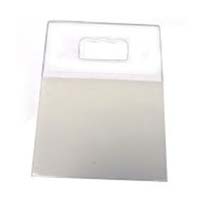 |
| Plate Impression In printmaking, an image is etched or carved onto a flat piece of wood or metal. Ink is then applied to the design, and it is pressed onto paper or canvas. Each copy made is one plate impression. |
Platen Press Cleaner A solution used to remove left over adhesive from the surface of a platen press.
Platens are flat metal (originally wood) plates that are pressed with great force against paper to create an impression. They were originally used in letterpress printing, and today are used to cut, crease or number digital or other prints. |
Plexiglass A widely accepted term for the acrylic glass often used in as the clear cover or “glazing” in framing (derived from the brand name Plexiglas). Acrylic glass is lighter than real (silicate) glass and allows for a clearer, untinted view of the artwork behind it. It does not shatter and can be treated to be archival and UV-resistant.
When you order your framed print, you can choose the best plexiglass for the display. |
Pliers In picture framing, a special type of pliers may be used to press points or brads into the back of picture frames to hold the contents in place.
In canvas stretching, another type of pliers is used to ensure the canvas is stretched as tightly as possible around the stretcher bar frame.
Order online: Canvas Pliers |
Ply Plies are the layers pressed together to create a piece of paper. The more plies, the thicker the paper (think 2-ply facial tissue). In picture framing, ply applies primarily to mat boards.
Mat boards are available in 2-ply, 4-ply, 6-ply and 8-ply. With each larger number, the mat board is thicker, which means the white bevel (if the mat's core is white) on the inner edge will be deeper. |
| PMMA PMMA or acrylic is a widely used transparent plastic material known for its applications in various markets from picture framing, car windows, smartphone screens to aquariums. It is a tough plastic, easy to shape and a great alternative to the high cost and less resilient glass. |
| Pneumatic hand tools A tool held in the hand and used manually, with the assistance of air power. The tool is generally hooked up to a tube that is affixed to an air compressor. |
Point driver A manual tool used in fitting images to picture frames. The gun is very similar to a heavy duty stapler, but the points (also called pins or tabs) are ejected outward from the vertical end, rather than downward from the base.
The point driver is placed flush against the backing of the framed image, with the vertical edge pressed against the exposed rabbet of the picture frame. When the trigger is squeezed, a small metal tab is driven partway into the wood, holding the contents of the frame in place.
Also called a pinner gun, the points may be flexible, and folded back to change the frame contents, or rigid for more permanent framing projects. |
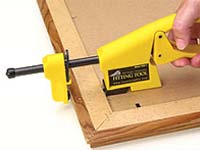 |
Point Squeezer A hand held, manual tool similar to pliers, used to force points or tabs into the exposed rabbet of a picture frame, holding the frame contents in place.
Unlike a point driver or pinner gun, there is no trigger that lends extra force to insert the point. Instead, the handles are squeezed together to press the sharp-tipped point into the wood. |
| Points Also called "tabs". The metal tabs used to hold the contents of a frame in place. They may be hammered into the wood, or forced in using a point gun. |
Polstyrene Styrofoam is the brand name for a synthetic polymer compound called polystyrene. Frames made from this "foamed" plastic (which is much denser and stronger than the white material used for coffee cups and packaging) are less expensive than wood frames, and generally lighter.
Once shaped, they can be coated in a laminate to look exactly like wood, and relief designs and ornamentation can be added to the foam prior to coating. Styrofoam frames are a bit weaker than wood frames, because the joints must be glued together rather than nailed. |
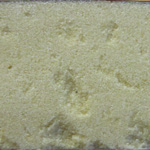 |
| Polyester Resin A type of viscous polymer that is often used in casting (poured into molds). Polyester Resin differs from epoxy resin in that it has less strength, is less adhesive, and tends to shrink. For these reasons, it is not often used as a coating, as epoxy resin is. |
| Polypropylene (PP) A type of plastic polymer often used in packaging materials. In picture framing, polypropylene adhesive corners may be used to affix images to a backing, or clear bags/sheets of the material may protect artwork. |
| Polystyrene Sheeting A type of acrylic glass used in picture framing. It is available with UV-protection, and scratch-resistant and non-glare coating. |
| Polyvinyl Adhesive Also called PVA, a rubber-textured polymer found in wood glue, white glue, carpenter glue and other adhesives. |
Poplar wood Poplar resides in the same family Aspen and Cottonwood, and is classified as a soft hardwood. In fact one of the softest hardwoods, it can cause problems when working by leaving a fuzzy texture behind on the edges after sanding or other light working.
Poplar has a light cream or yellow color, and a relatively uniform grain. It is generally quite inexpensive. |
Portrait Orientation Refers to the angle at which the framed or canvas image is hung. Portrait oriented images are those displayed so that the top edge (parallel to the floor) is the short dimension of the painting, and the side edge is the long dimension.
Also referred to as "vertical orientation".
The opposite of "landscape orientation". |
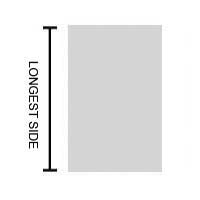 |
| Preservation Framing Preservation or conservation picture framing results in an archival quality display, and ensures that whatever processes are done to the art can be reversed without damaging the original piece. It requires the use of acid-free materials (paper, backing, adhesives) and UV-protective glass or plexiglass. |
| Pressure-Sensitive Mounting The act of affixing an artwork to another surface (foam core, gatorboard, dibond, wood panelling, canvas, etc) with an adhesive that does not require heat or a chemical additive to adhere to the artwork's surface. The materials will stick together using the force of the hand, or a press designed to apply a great amount of pressure. |
Pressure-Sensitive Tape A type of adhesive that does not require heat or a chemical additive in order to adhere to a surface. Pressure-sensitive tapes generally require only the force of the hand to make them stick, and have varying amounts of strength, depending on their intended use.
Masking tape, duct tape and cloth tape are examples of pressure-sensitive tape.
Order online:
Cloth Tape
ATG and Kraft Tape |
| Primary Colors A set of colors that, when combined, present as different colors. Red, green and blue are additive primary colors. When overlapped in different ratios, new colors are created. Yellow, cyan and magenta are subtractive primary colors used in mixing pigments or dyes. |
 |
Primed canvas A blank painter's canvas coated with a lead paint that reduces the absorbency of the canvas and improves the application the artist's paint. Canvas may be single or double-primed, as well as coated for a specific use, such as acrylic or oil paints.
KeenART Media offers double-primed and unprimed blank artist canvases for sale.
Order online: Artist Canvas |
| Priming The process of coating a canvas or paper with a clear or white medium that prepares the surface for the paint application. Canvases can be unprimed, single- or double-primed, and different primers are used for canvases intended for oil, acrylic or watercolor paints. |
| Profile The profile refers to the cross section of a picture frame molding, which shows the height, face width and shape (bevelled, scoop, etc), rabbet and lip. |
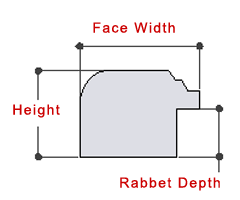 |
| Proof A part, miniature or full copy of a printed image, produced in order for the printer or artist to see how the final product will look. |
| Proof Sheet A small section of a digital image printed on canvas in order to determine the color saturation and texture of the inks on that particular surface. Often, multiple proofs will be printed on different surfaces with various color levels, in order to compare the results. |
| Purified Wood Pulp Also called "alpha cellulose". The material out of which mat board is generally made. "Purified" implies the product is lignin-free and of a neutral pH, and therefore suitable for conservation or archival framing. |
| Putty In picture framing, putty may be used to fill and disguise any gaps in the corners of the frame, or for concealing unwanted holes. |
|
© 2002-2026 - KeenART Media Ltd.
|
|
| |
|

